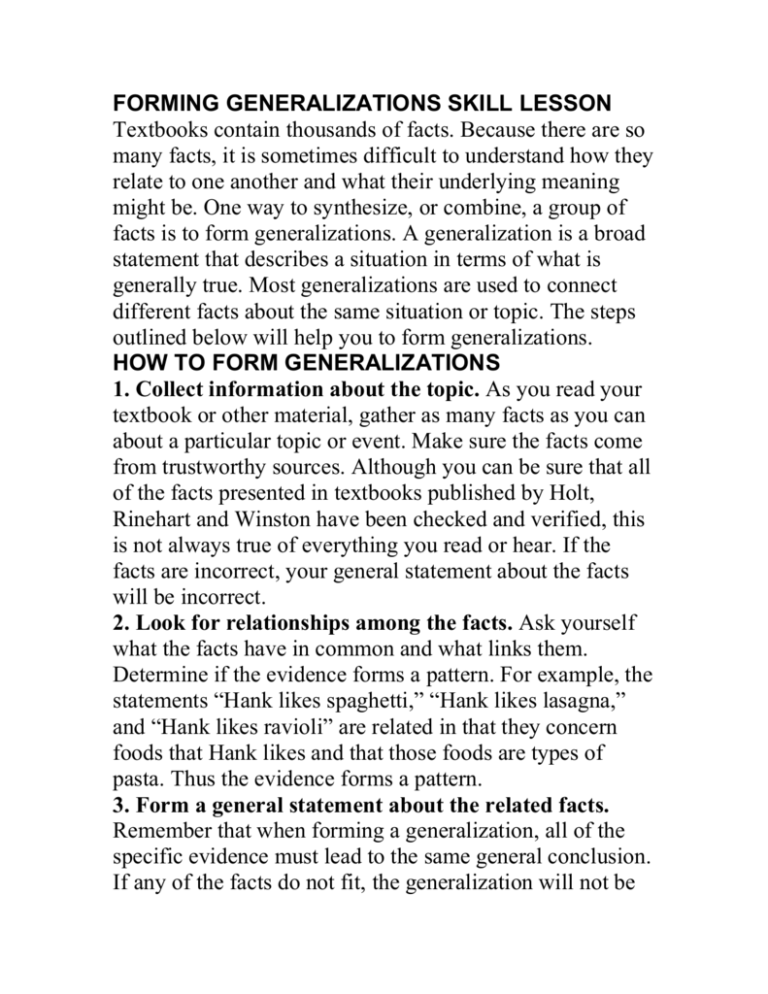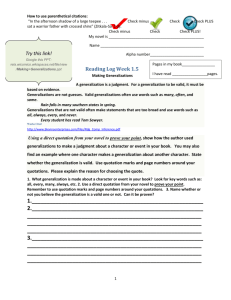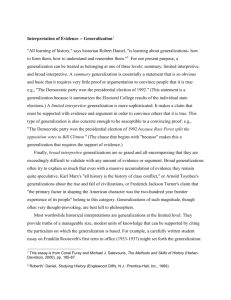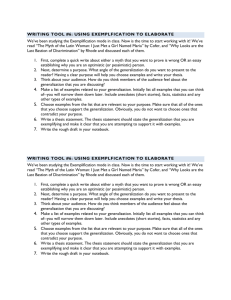FORMING GENERALIZATIONS SKILL LESSON
advertisement

FORMING GENERALIZATIONS SKILL LESSON Textbooks contain thousands of facts. Because there are so many facts, it is sometimes difficult to understand how they relate to one another and what their underlying meaning might be. One way to synthesize, or combine, a group of facts is to form generalizations. A generalization is a broad statement that describes a situation in terms of what is generally true. Most generalizations are used to connect different facts about the same situation or topic. The steps outlined below will help you to form generalizations. HOW TO FORM GENERALIZATIONS 1. Collect information about the topic. As you read your textbook or other material, gather as many facts as you can about a particular topic or event. Make sure the facts come from trustworthy sources. Although you can be sure that all of the facts presented in textbooks published by Holt, Rinehart and Winston have been checked and verified, this is not always true of everything you read or hear. If the facts are incorrect, your general statement about the facts will be incorrect. 2. Look for relationships among the facts. Ask yourself what the facts have in common and what links them. Determine if the evidence forms a pattern. For example, the statements “Hank likes spaghetti,” “Hank likes lasagna,” and “Hank likes ravioli” are related in that they concern foods that Hank likes and that those foods are types of pasta. Thus the evidence forms a pattern. 3. Form a general statement about the related facts. Remember that when forming a generalization, all of the specific evidence must lead to the same general conclusion. If any of the facts do not fit, the generalization will not be correct. For example, knowing that Hank likes spaghetti, lasagna, and ravioli could lead you to make the general statement that Hank likes pasta. If you know, however, that Hank likes lasagna and ravioli but hates spaghetti, you could not make the same generalization. 4. Make sure your generalization is valid. Keep in mind that your generalization must take into account all of the facts but must not make claims that the facts do not support. For example, if you hear a loud crash and the screech of metal, see a group of people gathering in the street, and then hear the siren of an approaching ambulance, you could use these facts to make the general statement that an accident has occurred. You could not, however, use these facts to say that there has been an accident involving an automobile and a motorcycle. PRACTICING YOUR SKILL To practice your skill, answer the questions and complete the activities that follow. 1. When forming a generalization, why is it important that all of the evidence lead to the same conclusion? 2. How can you determine if your generalization is valid? 3. Form a generalization based on the three statements below. • There are no cars in the school parking lot. • All of the school doors are locked. • There are no lights on in the school. 4. Determine which of the three statements below is a generalization. • Changes in technology affect the kinds of jobs available to workers. • In industry, automation has decreased the need for unskilled workers. • Improvements in farming technology have made it possible to grow more food using fewer workers. Menu Print 16 Social Studies Skills Review Name ________________________________________________ Class___________________ Date______________________ FORMING GENERALIZATIONS SKILL WORKSHEET APPLYING THE SKILL I Identify which statement in each set is a generalization by marking an X in the space provided. 1. ——— a. The sky is getting dark. ——— b. A storm is coming. ——— c. The temperature is dropping. ——— d. Clouds are forming. 2. ——— a. There are newspapers in the yard. ——— b. The house is dark. ——— c. The residents are on vacation. ——— d. No cars are in the driveway. 3. ——— a. Americans enjoy many rights and freedoms. ——— b. Americans have the right to criticize their government officials. ——— c. No one has the right to force a U.S. citizen to vote for a particular candidate. ——— d. Freedom of the press is guaranteed by the U.S. Constitution. APPLYING THE SKILL II In the space provided, write a generalization for each of the following sets of statements. 1. • When more than 5,000 U.S. banks failed in the early 1930s, many people lost their life savings. • During the Great Depression, many people waited in breadlines for bowls of soup and pieces of bread. • By 1932 about 12 million Americans were unemployed. Generalization: ________________________________________________ ____________________ ________________________________________________ _________________________________ ________________________________________________ _________________________________ 2. • The wealthiest 20 percent of the U.S. population controls about three fourths of the nation’s assets. • Nearly half of the total income of all Americans is earned by the richest 20 percent of the U.S. population. • It is estimated that the top U.S. corporate executives earn 100 times as much money as the lowest paid production workers. Generalization: ________________________________________________ ____________________ ________________________________________________ _________________________________ ________________________________________________ _________________________________ Menu Print HRW material copyrighted under notice appearing earlier in this work. Social Studies Skills Review 39 2. Journalists would first have to verify the accuracy of the statements contained in the flier. If their accuracy is verified, the following statements can be considered facts: city taxes have been increased four times over a 10-year period; 25 percent of public buses do not operate during rush hour; more than 200 of the city’s older citizens are waiting to participate in city-run programs; Ortega has served on the school board for more than 10 years. SKILL WORKSHEET APPLYING THE SKILL I 1. F 2. O 3. O 4. F 5. O 6. O 7. F 8. F 9. O 10. F APPLYING THE SKILL II All factual statements should contain information that can be verified. All opinions should be based on personal beliefs. FORMING GENERALIZATIONS SKILL LESSON 1. It is important that all of the evidence lead to the same conclusion because if any of the facts do not fit, the generalization will be incorrect. 2. A generalization can be considered valid if it is broad enough to take into account all of the facts but does not make claims that the facts do not support. 3. Students may say that the school is closed or that it is a weekend or holiday. 4. The generalization is “Changes in technology affect the kinds of jobs available to workers.” SKILL WORKSHEET APPLYING THE SKILL I 1. b 2. c 3. a APPLYING THE SKILL II 1. One generalization that may be formed is that the Great Depression was a time of enormous hardship for many Americans. 2. One generalization that may be formed is that most wealth in the United States is owned by a minority of the people.





